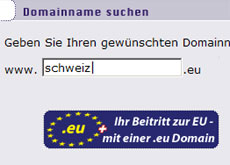Switzerland is last in line for “.eu” address

Switzerland will be left out in the cold in December when the European Union (EU) begins accepting registration for internet addresses ending in ".eu".
Because EU regulations prohibit non-members from protecting domain names, addresses such as “switzerland.eu” or “matterhorn.eu” could end up belonging to anyone in Europe.
When the domain name “.eu” is launched next month, it will be the first time that a community of countries has been granted its own internet address.
Special regulations have been adopted for its use, including restricting “.eu” to individual residents of the EU and to organisations or companies established in the EU.
Left unprotected are governmental institutions and countries, such as Switzerland, which are located in Europe but are not EU members.
Beat Fehr, head of one of two Swiss internet firms accredited to sell “.eu” addresses, told swissinfo that governmental entities rarely if ever meet the relevant EU residency requirements.
Therefore, he said, there is a real danger of losing iconic Swiss names to foreigners.
Lack of interest
Moreover, despite his repeated urgings that the federal administration, local governments and businesses should lobby for an expansive interpretation of the “.eu” designation to include all European countries, Fehr said his efforts have aroused little interest.
“The problem of registering for ‘.eu’ domains is simply not taken seriously by political, economic or local authorities,” he said.
But Peter Fischer, vice-director of the Swiss Federal Communications Commission, said that his ministry and other governmental authorities have been intensively engaged with the domain question.
“We simply can’t do the same things that we could if we were in the EU,” explained Fischer.
Three years ago, the Federal Communications Commission sought talks with the EU, to no avail.
“They were adamant. Not only towards Switzerland, but also towards members of the European Economic Area (EEA) – Iceland, Liechtenstein, and Norway – that are also non-EU members.”
Fischer said Switzerland has been in constant contact with the EU ever since – “up to now, unsuccessfully”.
Ultimately, it may be that the “.eu” issue will have to be clarified in a new set of bilateral accords, which, he added, were not in the offing.
Assuming that the EU does not suddenly alter its regulations, Switzerland will be last in line when the rush for “.eu” addresses begins in the first of three phases on December 7.
Counterweight
Decided by the EU Commission in October 2000 as a counterweight to the US-dominated “.com” addresses, “.eu” is supposed to be at the disposal only of organisations, firms and individuals established in EU countries.
But a commission edict in 2002 broached the possibility of allowing the three non-EU countries that are members of the EEA access to the “.eu” addresses.
A potential relaxation would still leave Switzerland out of the loop, however, as Swiss voters vetoed EEA membership in 1992.
For Swiss who are absolutely determined to have a “.eu” address, Fehr said the only alternative is to found a firm in the EU, something that is far less complicated than it sounds.
“It costs only €25 (SFr39) to found a firm in Germany,” explained Fehr. “In Britain businesses can even found a firm over the internet for £34 (SFr78).”
This option is unavailable to government and public authorities, however.
What’s more, should Switzerland ever wish to become an EU member, it would still not be possible to get the relevant addresses back.
“It would really be a pity if names that epitomise Switzerland, such as ‘matterhorn.eu’ or ‘switzerland.eu’, end up belonging to [people in other countries],” said Fehr.
Registration for internet addresses ending in “.eu” begins on December 7, 2005.
It will take place in three phases: until February 7, 2006, public bodies and trademark holders may register; until April 7, 2006, recognisable businesses and artistic identifiers may register; after that, the general public may register.
To obtain a “.eu” address, a person or institution must have a postal address in one of the 25 EU member countries.
In Switzerland only two internet firms are accredited to sell “.eu” addresses.
(Adapted from German by Kathleen Peters)

In compliance with the JTI standards
More: SWI swissinfo.ch certified by the Journalism Trust Initiative



You can find an overview of ongoing debates with our journalists here. Please join us!
If you want to start a conversation about a topic raised in this article or want to report factual errors, email us at english@swissinfo.ch.